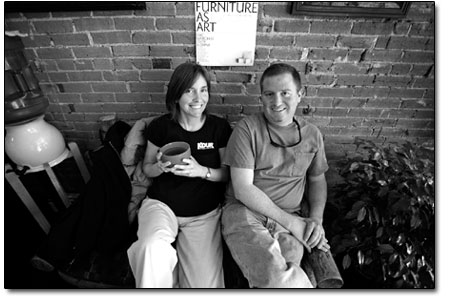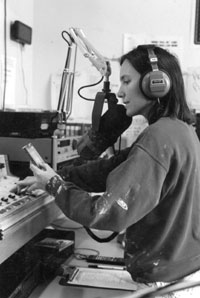|
| ||||||
| Signing off
by Missy Votel If there’s one rule at Fort Lewis College’s KDUR radio, it’s anything goes. But after nearly 13 years at the station, eight at the helm, Station Manager Nancy Stoffer has announced she, too, will be going. “KDUR is so much fun, you can do whatever you want – unless the FCC steps in,” quipped Stoffer, only partly joking. When Stoffer started as program director back in the mid-90s, the station’s FCC license was on hold, thanks to a complaint over on-air profanity. Due to a federal backlog, it was withheld for four years, but was eventually renewed. Although the offending phrase has been expunged from memory, Stoffer, whose tenure expands beyond her 13 paid years to several as a volunteer DJ, still remembers vividly her first day behind the mic. “(Then Station Manager) Tami Graham gave me 15 minutes of instruction and that was it,” Stoffer said. “I told her I didn’t know anything about music, but she said she didn’t care.” Fortunately for Stoffer, the latest technological innovation, the compact disc, had just been introduced. “I just started playing all the CDs the station had,” she said. “I learned there’s so much dark, dusty-corner music out there. Music that defies definition and categorization.” Some would argue that since it first hit the airwaves in 1975, KDUR has managed to defy such categorization. From its humble beginnings as a student-run club, which took weekends, late nights and summer vacations off, KDUR has grown into a unique community-college partnership with round-the-clock and round-the-calendar programming. And with the anticipated upgrade from a 150 watt antenna to a high-powered 6,000-watt transmitter, the KDUR signal will be more predictable than ever, but don’t expect the format to follow suit. “We’ve never played ‘Alice’s Restaurant,’ you can hear that elsewhere,” said Program Director and incoming Station Manager Bryant Liggett. “But if you want to hear a three-hour special on the ‘White Album,’ we’ve got it.” It’s this dedication to the unique, obscure, underground and just plain weird that has driven the KDUR philosophy over the years. Liggett points to such oddities as the recent addition of “Oni Baku,” a surprisingly popular Japanese pop and video game music show started by two freshmen. It is this sort of innovation that typically wins applicants one of the station’s 50 or so coveted programming slots. Other notable musical curiosities over the years include Gaia (“female wiccan music and forest chanting”); klezmer (“traditional Jewish music bordering on jazz”); and the ever-popular mash-ups (the “mashing up of two relatively well known songs with equal time and beat.”) Of course, this isn’t to say KDUR doesn’t dabble in the occasional mainstream sound. Some of the station’s longstanding mainstays include bluegrass, Celtic, punk rock and alt country. During Stoffer’s reign, KDUR was home to more than just music, with such unique talk radio offerings as “The Astrological Weather Report,” “Food Divas,” “Cycle KDUR has grown into a unique community-college partnership with round-the-clock and round-the-calendar programming. And with the anticipated upgrade from a 150 watt antenna to a high-powered 6,000-watt transmitter, the KDUR signal will be more predictable than ever, but don’t expect the format to follow suit. “When it comes down to rules, there’s very little that you can’t do as opposed to a huge amount of things that you can do,” said Liggett.
“When it comes down to rules, there’s very little that you can’t do as opposed to a huge amount of things that you can do,” said Liggett. And, for the most part, civility and respect tend to prevail in this mostly self-regulated setting. “The best thing about KDUR is that in my 19 years at the station, everyone has gotten along so well. It’s like a playground,” said Stoffer. Of course, there are some exceptions. For example, on-air blow ups as well as attempts to sleep off a big night of partying and being discovered by the Sunday morning classical music host (true stories, both) are grounds for automatic dismissal. But for the most part, KDUR, which relies heavily on its volunteer DJs (much more in the summertime) is happy to have whatever help it can find. This also includes assistance in the form of grants, student fees, underwriting and cold, hard cash. Over the years, the station has gotten innovative with its fund-raising efforts. One of Stoffer’s first orders of business was replacing the Bachelor/Bachelorette Auction4 (an idea whose time had come and gone, she said) with the “Furniture as Art” auction, which returns on March 19. The idea to auction off functional art pieces, which came from a student, was, and continues to be, the stations’ most lucrative event. “The first year, there were a lot of naysayers, but it was the most financially successful event KDUR’s ever done, and it still is,” said Stoffer. Other events that round out KDUR’s fund-raising efforts include bi-annual fund drives; the Halloween Transvestite Ball; and semi-regular “Cover Nights” (the latest of which will feature The Clash on March 21 at The Summit.) Cover Night was the idea of Lawn Chair Kings frontman and DJ, Eric Nordstrom, and former Program Director Jason Repko. The first Cover Night, a tribute to Neil Diamond, proved immensely popular and was quickly followed by tributes to Madonna, Johnny Cash, Kiss and Elvis, to name a few. And while the shows draw a large crowd, they also draw a large cross-section of local musicians (everyone from Bubba to harpist Sylvia Zurko, who played Johnny Cash night) – and nonmusicians (the “band” Scrubber, which debuted at “One Hit Wonder Night” playing inanimate objects including an electric shaver.) But for Stoffer, it wasn’t all Scrubber shows and astrological forecasts. There were some high-profile conquests as well, including a memorable interview with author Terry Tempest Williams as well as the biggest coup of her career thus far, the infamous chat with Bill Clinton. But it didn’t come easy. “They just called up last summer out of the blue and asked who wanted to talk to Bill Clinton,” Stoffer recalled. “I had to call all these different numbers, and then type in a secret code and get transferred all over the place.” Perseverance paid off, and Stoffer was soon having a candid discussion with the former resident. “I asked him if he became the first man, would he redecorate the White House,” she said. “He said he would do whatever it took, and that he was pretty good at decorating.” Perhaps because of the interview, or despite it, Stoffer said she is contemplating a future in politics. “I was too late to get in the City Council race, but tell people they can write me in,” she said. In the meantime, both Stoffer, whose last official day is March 31, and Liggett are focused on the upcoming fund-raisers, and oh yeah, moving the station. The CUB’s cafeteria is being renovated to house KDUR, the Fort Lewis College Independent and Durango Community Access Television. “It will be great to have everybody in the same place,” Stoffer said. “When you put all those elements together and give them time to mix, that’s when great things happen.” Unfortunately, like all great things, they only come to those who wait. While the CUB is being rebuilt, KDUR and the Indie will be moved to a barren prairie dog colony on the northeast corner of campus affectionately known as “The Trailer Park.” But Liggett assures KDUR listeners that despite the less-than presidential quarters, KDUR will continue to offer a little something for everybody. “The good thing about KDUR is that I know when people turn it off because they don’t like something, they’ll be back, because something they do like will be on later.”
|
In this week's issue...
- December 18, 2025
- Let it snow
Although ski areas across the West have taken a hit, there’s still hope
- December 18, 2025
- Look, but don't take
Lessons in pottery theft – and remorse – from SW Colorado
- December 11, 2025
- Big plans
Whole Foods, 270 apartments could be coming to Durango Mall parcel




